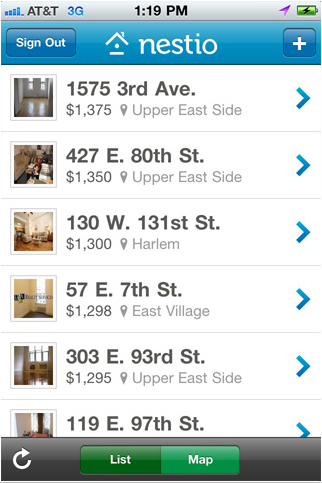 Nestio, a startup that aims to calm and organize the frantic process of searching for an apartment, announced today that it has closed a $750,000 seed funding round. The round was led by Quotidian Ventures, with contributions from a number of angel investors, including Joanne Wilson, Rick Webb, Josh Auerbach, and David Tisch.
Nestio, a startup that aims to calm and organize the frantic process of searching for an apartment, announced today that it has closed a $750,000 seed funding round. The round was led by Quotidian Ventures, with contributions from a number of angel investors, including Joanne Wilson, Rick Webb, Josh Auerbach, and David Tisch.
The startup plans to use its recent funding to build out its development team and is currently working on adding a number of features that will provide deeper context and transparency to apartment listings. While the service currently only offers web and mobile support to New York City, the startup also plans to use its new capital to begin rolling out support for additional cities in the next few months.
The New York-based TechStars grad is building a service that allows users to save apartment listings from across a variety of sites all in one place, using Nestio’s platform. The startup hopes to put an end to long email chains, messy spreadsheets, and multiple tabs in one’s browser.
Nestio enables users to edit listing information, add comments, and to collaborate with roommates in realtime during apartment searches by sharing listings, photos and notes. Nestio also recently released the first version of its iPhone app to let users to keep track of the places they view on the go, so that apartment searchers can upload photos and notes right after a walk-through of a new apartment, for example.
With comparable services like Apartments.com, Padmapper.com and Hotpads.com, to name a few, already in the space, Nestio certainly has its work cut out. However, optimized mobile functionality is a huge leg up for Nestio, as the majority of mobile apartment search services out there leave quite a bit to be desired in terms of mobile functionality.
Plus, with Nestio intending to provide a supplement to the value of listing services like Zillow and Trulia, there’s something to be said for a startup that aims to tame the apartment search process and doesn’t compete with these well-established, highly inventoried services, and instead acts as a logical extension.
For those looking to learn more, check out our original writeup of Nestio here.